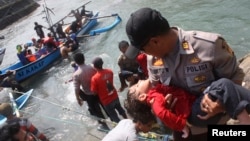JAKARTA —
Officials from more than a dozen countries discussed plans to combat people smuggling and human trafficking during talks in Indonesia on Tuesday. The talks focused on regional cooperation to prevent, detect and prosecute smugglers, while protecting victims.
The number of people seeking asylum from places like Iran and Afghanistan has risen sharply in recent years, and led to alarm from the United Nations and other groups over the increasing number of deaths of asylum seekers at sea.
The asylum seekers are from across Asia, from Burma’s stateless Rohingyas to religious minorities in Pakistan, Iran and Afghanistan. In an effort to reach Australia, where they hope to resettle, they often fall victim to smugglers who charge high prices for transport on rickety, overcrowded boats.
Unlike previous talks on the issue, which have been short on concrete outcomes, Tuesday’s meeting was action oriented, said Indonesian Foreign Minister Marty Natalagawa. Countries at the talks committed to carrying out simulated search and rescue operations, known as tabletop exercises, he said.
“This after all is one area that many of us have been driven into a great deal of concern about, the loss of life caused by incidents at sea, and now countries of this region, we commit ourselves to introduce the notion of tabletop exercises.
Representatives from countries including Afghanistan, Bangladesh, Cambodia, Burma and Pakistan agreed to a 10-point declaration to address people smuggling. The measures include better information sharing between immigration officers, airline operators and law enforcement.
The declaration also includes steps to encourage voluntary repatriation to those found not in need of international protection, and committed countries to work toward adopting people smuggling as an extraditable offense.
The recent agreement between Australia and Papua New Guinea on asylum seekers was also discussed. Under that policy, any boats carrying refugees to Australia would instead be sent to Papua New Guinea, where occupants would have their claims processed and possibly be resettled. The policy remains controversial, because it bans such asylum seekers from ever resettling in Australia.
Papua New Guinea's Foreign Minister Rimbink Pato explained the current arrangement.
“The message that we are getting out to the public is that if you are sailing on a course to seek asylum in Australia, you are not going to Australia but you are coming to Papua New Guinea, and in Papua New Guinea you are welcome," he said.
One the major countries not in attendance at Tuesday’s meeting was Iran. That could be related to a new policy under which Indonesia will no longer grant visas on arrival to Iranians. That ban, which follows pressure from Australia, is set to take effect this week.
The number of people seeking asylum from places like Iran and Afghanistan has risen sharply in recent years, and led to alarm from the United Nations and other groups over the increasing number of deaths of asylum seekers at sea.
The asylum seekers are from across Asia, from Burma’s stateless Rohingyas to religious minorities in Pakistan, Iran and Afghanistan. In an effort to reach Australia, where they hope to resettle, they often fall victim to smugglers who charge high prices for transport on rickety, overcrowded boats.
Unlike previous talks on the issue, which have been short on concrete outcomes, Tuesday’s meeting was action oriented, said Indonesian Foreign Minister Marty Natalagawa. Countries at the talks committed to carrying out simulated search and rescue operations, known as tabletop exercises, he said.
“This after all is one area that many of us have been driven into a great deal of concern about, the loss of life caused by incidents at sea, and now countries of this region, we commit ourselves to introduce the notion of tabletop exercises.
Representatives from countries including Afghanistan, Bangladesh, Cambodia, Burma and Pakistan agreed to a 10-point declaration to address people smuggling. The measures include better information sharing between immigration officers, airline operators and law enforcement.
The declaration also includes steps to encourage voluntary repatriation to those found not in need of international protection, and committed countries to work toward adopting people smuggling as an extraditable offense.
The recent agreement between Australia and Papua New Guinea on asylum seekers was also discussed. Under that policy, any boats carrying refugees to Australia would instead be sent to Papua New Guinea, where occupants would have their claims processed and possibly be resettled. The policy remains controversial, because it bans such asylum seekers from ever resettling in Australia.
Papua New Guinea's Foreign Minister Rimbink Pato explained the current arrangement.
“The message that we are getting out to the public is that if you are sailing on a course to seek asylum in Australia, you are not going to Australia but you are coming to Papua New Guinea, and in Papua New Guinea you are welcome," he said.
One the major countries not in attendance at Tuesday’s meeting was Iran. That could be related to a new policy under which Indonesia will no longer grant visas on arrival to Iranians. That ban, which follows pressure from Australia, is set to take effect this week.











